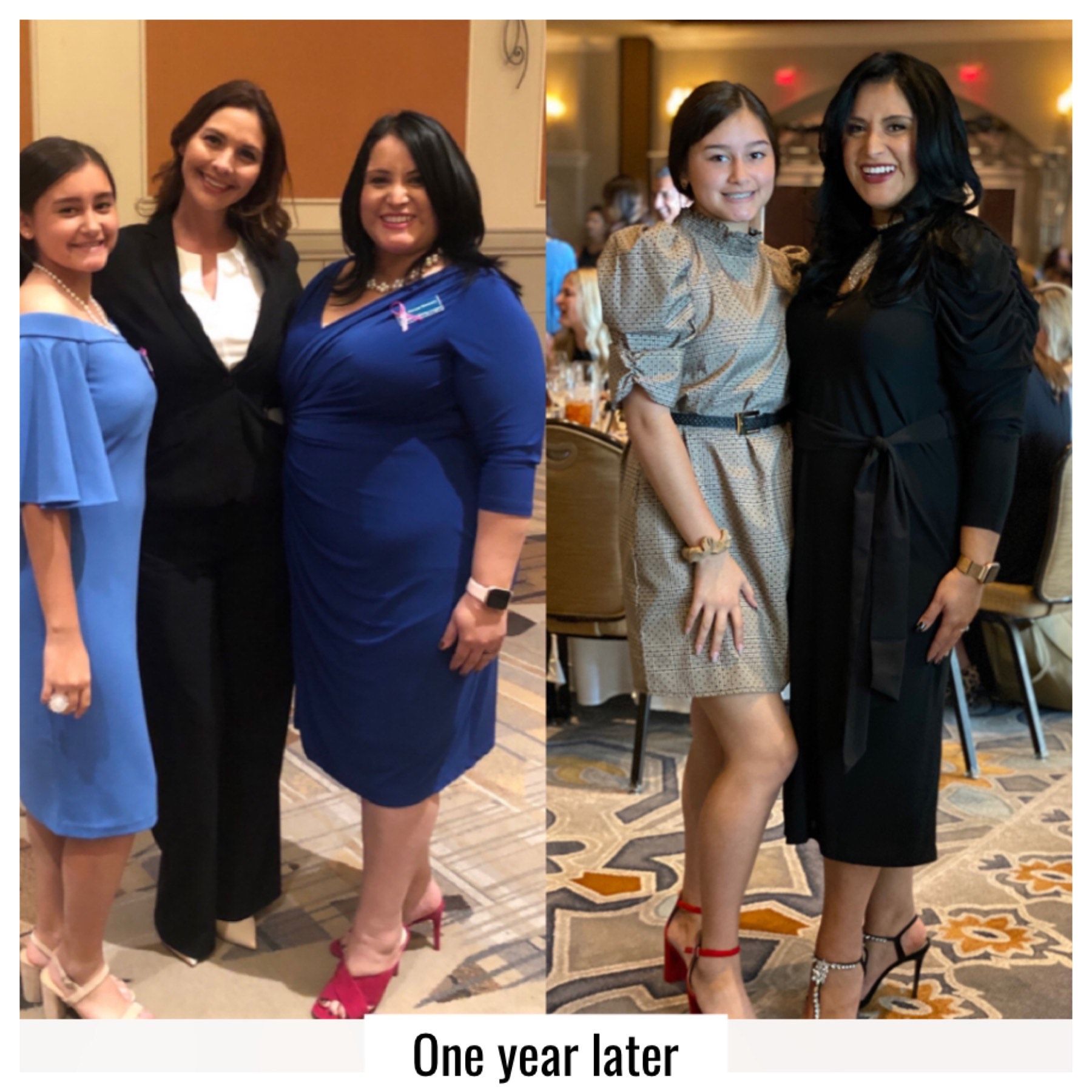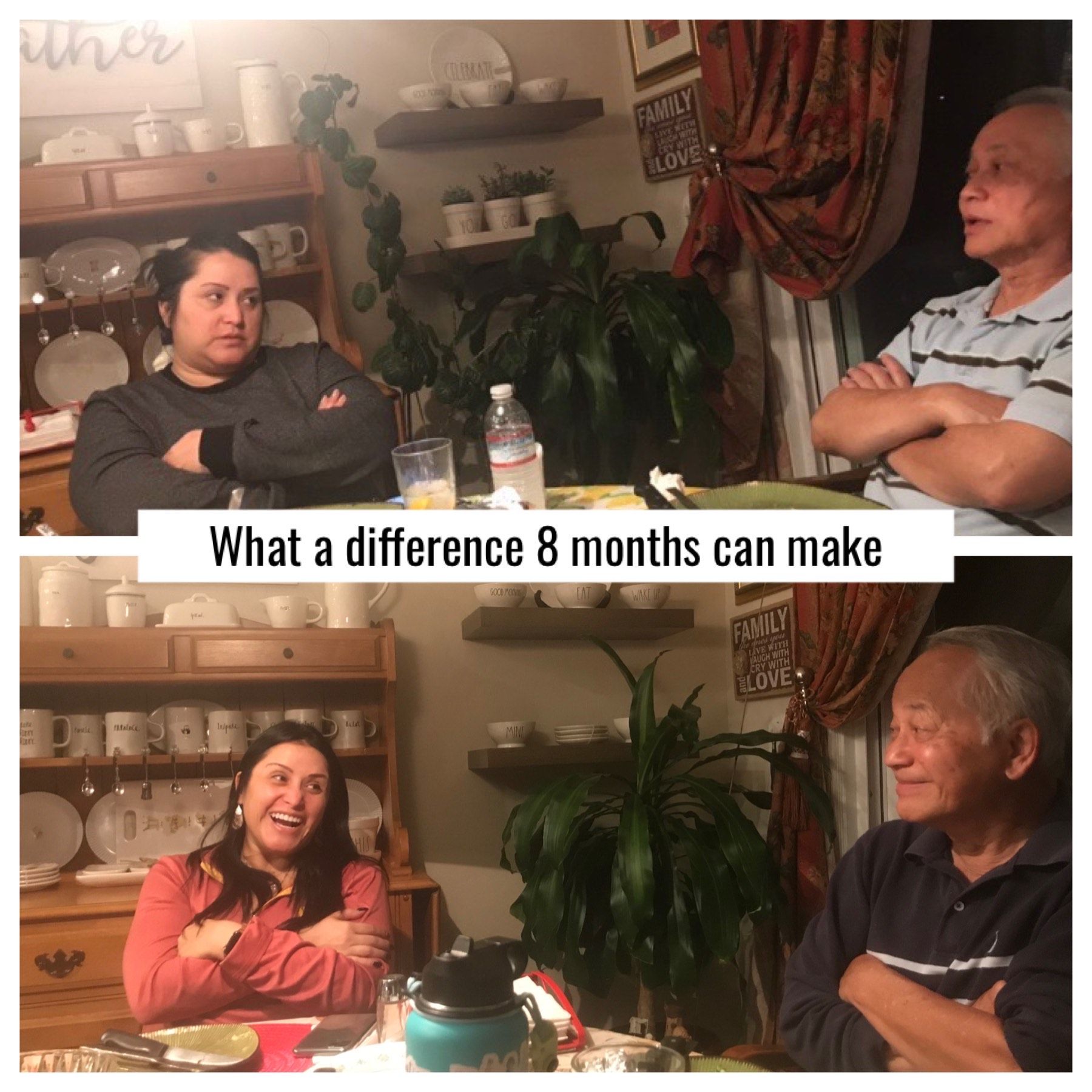Jacqueline
Life before surgery
Many people who come into Dr. Oliak’s Orange County office for weight loss surgery have a “final straw” moment: something happens that makes them realize it’s time to take new action for their health.
For Jacqueline, the “final straw” came when she tore a ligament in her ankle while getting ready for a Christmas party. The resulting boot and crutches made her say to herself, “This will only get worse if I can’t be active.”
By “this” she meant being overweight. Before having kids, Jacqueline had lost a lot of weight by being really active. But during her first pregnancy, she gained 70lbs and from there “it just piled on.” Then her health problems started, and nobody could seem to get to the bottom of it. The 7 years after having her last child were marked by frequent doctor appointments and medical tests. During that time she underwent a hysterectomy, and at one point was taking a medication for myasthenia gravis. Her rheumatologist at the time told her, “You have to monitor yourself closely, because you could just die.”
Throughout her ordeal Jacqueline fought hard to be healthy. In addition to her dogged pursuit for answers and treatments, she tried (among other things) gluten-free and dairy-free diets that ultimately didn’t help. And chocolate never seemed to want to stop being delicious at 6PM, making it hard to completely abstain from it.
Then she tore her ankle ligament and said “This is where this ends.” In February, she hobbled into Dr. Oliak’s office—boot, crutches, and all—for her initial consultation.
Finding a weight loss surgeon she could trust
After 7 years of ups and downs in the healthcare system, Jacqueline’s #1 priority for finding a doctor—any doctor—was trust, and for a surgeon, doubly so. Other weight loss surgeons were recommended to her, but a work colleague had had his surgery with Dr. Oliak. From him, Jacqueline heard what she needed to hear: concierge-level care, personalized to your situation.
“Given everything I’d been through, trusting my doctor is the most important thing for me. I knew a lot of weight loss surgeons were just in it for the money and that it’s a business to them. They herd you like cattle. That was not the experience I wanted to have,” said Jacqueline.
“Dr. Oliak earned my trust during that first visit. He sat with me and explained everything to me. There was no fat shaming or blaming about my weight.
Instead he talked to me about the biology of obesity and how hard the body fights to hang onto excess weight. He validated me, and that made me feel comfortable. I really needed that. I needed to understand what was happening metabolically,” she said.
Dr. Oliak approaches that initial consultation as an opportunity for patient education—and Jacqueline’s visit was no exception. Dr. Oliak says, “Patient education is essential for their success with weight loss surgery. Like Jacqueline, many of my patients come in either blaming themselves, or fearful of being blamed. I want everyone who comes through my door to understand why it’s so difficult to lose weight through diet and exercise alone.
“Like I do with all of my patients, I discussed the concept of the body weight set point with Jacqueline. This set point is the weight that your body thinks is normal and healthy, even if it’s actually unhealthy. When you start losing weight, the body believes it is under attack, and immediately tries to prevent weight loss by increasing appetite and decreasing metabolism. In fact, for every one kilogram (2.2lbs) of weight lost through diet and exercise, appetite increases by about 100 calories per day. Metabolism decreases by about 20-30 calories per kilogram.
“In plain terms, this means the person trying to lose weight gets hungry to make them eat more calories, and their metabolism slows to prevent burning the calories off.
Diet and exercise can help you lose weight, but 95-98% of people fail to keep it off. It’s hard to fight the body weight set point.”
Dr. Oliak and Jacqueline decided that sleeve gastrectomy (also known as vertical sleeve gastrectomy, VSG, gastric sleeve, or simply sleeve) would be the best option for her surgery.
Jacqueline’s gastric sleeve surgery: recovery and a new life
Dr. Oliak performed Jacqueline’s gastric sleeve surgery at Placentia-Linda Hospital in Orange County.
“One of the things Dr. Oliak told me was that you don’t just have to recover from the surgery, you have to recover from everything that got you to the point where you needed surgery. I thought about that a lot during the healing process,” said Jacqueline.
At the time of this writing, Jacqueline is a year post-op. As she reflected on her surgery, she talked about how her experience of and attitudes about eating have changed.
“Because of the small size of the sleeve, I can only eat so much. But when you first look at that 2 oz of food on the plate, you wonder, ‘Where’s the rest of it?’ My body feels full quickly, but my mind doesn’t always get the message.
“Changing my habits is an ongoing process. When I feel that urge to eat, I have to think about whether or not I’m actually hungry. Maybe I’m thirsty. Maybe I didn’t eat enough protein today. Maybe I had too many carbs, which sets off its own chain of cravings. I have to pay attention to those cues. I now focus on eating mindfully, and eating for nutrition.”
And how did weight loss surgery affect Jacqueline’s health problems? “I haven’t had to go to the doctor aside from seasonal allergies. Because the amount of food I’m eating is so reduced, I’ve discovered food allergies I didn’t know I had. For example, shrimp causes little breakouts around my nose. I’ve been able to stop eating the foods that I didn’t know were causing me problems.”
In addition to feeling healthy and well, Jacqueline has lost 80 pounds. People still approach her to tell her how great she’s looking these days.
And she has a message for anyone considering weight loss surgery with Dr. Oliak. “I want them to know they’re in good hands, and that Dr. Oliak is really compassionate. There’s no shaming or blaming, there’s no elitist approach. I felt comfortable telling him the truth about what was happening with me. He treats the whole patient, and his staff has that approach too. I could tell the entire office was committed to my success. The care is at a concierge level. Now that I’ve reached the year mark, I realize I won’t be seeing them as often. I’m going to miss them. It’s an overused phrase but I had such a VIP experience.”




